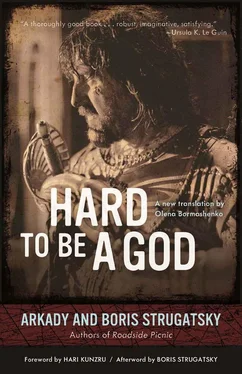“We’d have to repeat it, Your Majesty,” Budach said mournfully.
“All right, the Lord be with us!” the king said, bringing the goblet almost to his mouth—but he suddenly jerked it away so abruptly that it splashed onto the tablecloth. “Hey, you drink some first! I know you Irukanians! You sold Holy Míca to the barbarians! Drink it, I say!”
Budach took the goblet with an offended look and drank a few sips.
“Well, how is it?” said the king.
“It’s bitter, Your Majesty,” Budach said in a choked voice. “But you have to drink it.”
“Haaave to, haaave to…” the king said peevishly. “I know I have to myself. Hand it over. Look at this, you polished half of it off, took your chance…”
He tossed off the goblet in one gulp. Sympathetic sighs sounded around the table—and suddenly everything went still. The king froze with his mouth open. Tears rained from his eyes. He slowly turned purple, then blue in the face. He stretched out a hand above the table, convulsively snapping his fingers. Don Reba hastily handed him a pickle. The king silently hurled the pickle at Don Reba and again stretched out his hand. “Wine…” he wheezed.
Someone dashed off and got the pitcher. The king, his eyes frantically rolling, swallowed loudly. Red rivulets were pouring down his white waistcoat. When the pitcher was empty, the king threw it at Budach but missed. “Bastard!” he said in an unexpectedly bass voice. “What did you kill me for? Haven’t we hanged enough of you? Blast you!”
He stopped and touched his knee.
“It hurts!” he said in his former nasal voice. “It still hurts!”
“Your Majesty,” said Budach. “For a complete cure, the potion must be taken every day for at least a week’s duration—”
Something squeaked in the king’s throat. “Out!” he shrieked. “Everyone get out!”
The courtiers, overturning their chairs, swarmed toward the doors.
“Ouuut!” the king screeched, sweeping the dishes off the table.
Rumata rushed out of the hall, then ducked behind a curtain and began to laugh. Someone else was also laughing behind the adjacent curtain—hysterically, gasping for breath, with little yelps.
His shift at the prince’s bedchamber started at midnight, so Rumata decided to stop by his house to make sure everything was in order and to change clothes. The city this evening amazed him. The streets were dead silent, the taverns closed. Clusters of storm troopers with torches in their hands were standing around at the intersections, clanking their weapons. They were quiet, as if waiting for something. A number of them approached Rumata, took a good look at him, and after recognizing him, just as silently let him pass. When he was about fifty steps from his door, a group of shady characters began to trail him. Rumata stopped, clanked his scabbards against each other, and the characters fell back, but he immediately heard the sound of a crossbow being loaded in the dark. Rumata hurried onward, clinging to the walls, groped for the door, and turned his key in the lock. He remained aware of his unprotected back the entire time, and he rushed into the entrance hall with a sigh of relief.
All the servants were gathered in the entrance hall, armed as best they could be. It turned out that the door had already been tried a few times. Rumata didn’t like that. Maybe I shouldn’t go? he thought. To hell with him, the prince.
“Where’s Baron Pampa?” he asked.
Uno, extremely agitated and with a crossbow on his shoulder, answered: “The baron woke up at midday, drank all the brine in the house, and again left to make merry.” Then, lowering his voice, he informed Rumata that Kira had been very worried and had asked about the master more than once.
“All right,” said Rumata. He ordered the servants to line up.
There were six servants, not counting the cook, all of them tough and used to street brawls. They wouldn’t tussle with the gray soldiers, of course—they’d be afraid of the anger of the all-powerful minister—but they’d be able to withstand the tramps from Waga’s night army, especially since tonight the bandits would be looking for easy prey. Two crossbows, four poleaxes, heavy butcher knives, iron hats; the doors were sturdy and bound with iron, as was the custom. Or maybe he really shouldn’t go?
Rumata went upstairs and tiptoed into Kira’s room. Kira was sleeping fully clothed, curled up on the still-made bed. Rumata stood over her with a lamp. To go or not to go? He really didn’t want to go. He covered her with a quilt, kissed her cheek, and came back to his study. He needed to go. Whatever was happening, an operative had to be in the center of things. And it benefits the historians. He chuckled, took the circlet off, wiped the lens carefully with a soft piece of suede, and put it back on. Then he called Uno and ordered him to bring a military uniform and a polished brass helmet. Shivering from the cold, he pulled on a metalstrom shirt shaped like chain mail underneath his waistcoat, right over his undershirt. (The local chain mail offered decent protection from swords and daggers, but crossbow bolts punched right through it.) Tightening the uniform belt with the metallic buckles, he told Uno, “Listen, kid. You’re the one I trust the most. Whatever happens here, Kira must remain alive and well. Let the house burn down, let all the money get stolen, but you must save Kira for me. Take her away over the rooftops, down through the cellars, whatever you like, but save her. Got it?”
“Got it,” said Uno. “Maybe my master shouldn’t go today.”
“You listen to me. If I don’t come back after three days, take Kira and bring her to the saiva, to the Hiccup Forest. Know where it is? Anyway, in the Hiccup Forest you should find the Drunken Lair—it’s a hut not far back from the road. If you ask, you’ll be shown the way. Just be careful who you ask. A man called Father Cabani will be there. You’ll tell him everything. Got it?”
“Got it. Only maybe master shouldn’t go.”
“I wish I didn’t have to. I do—duty calls. Well, take care.”
He gently flicked the boy’s nose and returned his awkward smile. Downstairs, he gave the servants a short pep talk, went out the door, and found himself in the dark again. The bars clanged shut behind him.
The prince’s chambers had been poorly guarded through the ages. It’s possible that was precisely why no one ever attempted to assassinate the Arkanarian princes. And there was definitely no one interested in the current prince. No one in the world needed this sickly blue-eyed boy who resembled anyone but his father. Rumata liked the boy. His education had been woefully neglected, and therefore he was smart, wasn’t cruel, and—probably instinctively—couldn’t stand Don Reba. He liked to sing a variety of songs set to Zuren’s poetry and to play with boats. Rumata had ordered him picture books from the metropole, told him about the starry sky, and had won the boy once and for all with his tale of flying ships. For Rumata, who rarely interacted with children, the ten-year-old prince was the antithesis of every social class in this savage country. It was ordinary blue-eyed boys like this one, identical in every social class, who would grow up to be brutal, ignorant, and submissive men; and yet they, the children, showed no traces or beginnings of such rot. Sometimes Rumata thought it’d be great if all the people older than ten years of age disappeared from the planet.
The prince was already asleep. Rumata started his shift—he stood by the sleeping boy next to the departing guardsman, performing the complex motions with drawn swords required by etiquette. Then, as prescribed by tradition, he checked whether all the windows were locked, whether all the nurses were in place, and whether all the lamps were lit in all the chambers. After this, he came back to the front room, played a game of dice with the departing guardsman, and inquired how the noble don felt about what was happening in the city. The noble don, a man of great sagacity, thought very hard and conjectured that the common people were preparing to celebrate the Day of Holy Míca.
Читать дальше












